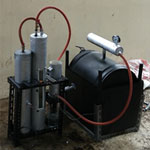Pengolahan Sampah Plastik Memakai Teknologi Pirolisis Untuk Pembelajaran dan Konservasi Lingkungan di Pondok Pesantren Al-Anwar Sarang Rembang, Jawa Tengah
DOI:
https://doi.org/10.14421/jbs.1230Keywords:
pengolahan, sampah plastik, bahan bakar, pendidikan, petomAbstract
Jumlah santri yang mencapai 4.986 orang di ketiga Pondok Pesantren Al-Anwar menyebabkan produksi sampah di lingkungan pondok lebih dari satu ton per harinya. Sejumlah 239,93 kg sampah merupakan sampah plastik yang tidak mudah terurai di lingkungan karena sifatnya yang nonbiodegradable. Hal ini menimbulkan pencemaran lingkungan, terlebih ketika sampah dibakar di udara terbuka dan dibuang ke laut seperti metode penanganan sampah yang dilakukan oleh pengurus pondok saat ini. Dalam penelitian ini diharapkan menjadi langkah awal pembelajaran pelestarian lingkungan dengan teknologi pirolisis. Penelitian dilakukan dengan membuat model mesin pirolisis Plastic to Oil Machine (PeTOM), berkapasitas 30 liter. Dengan mesin ini, minyak mulai dihasilkan pada menit ke-45 yang mana setiap 1 kg sampah plastik menghasilkan 0,4-0,49 kg minyak bakar. Potensi minyak bakar yang dihasilkan di Pondok Pesantren Al Anwar adalah 239,33 liter per hari dengan potensi ekonomi setara dengan Rp. 35.899.200,00 per bulan.
[The number of students who reached 4,986 people in the three Pondok Pesantren Al Anwar cause waste production in the cottage neighborhood more than one ton per day. A total of 239.93 kg of waste is a plastic waste that is not easy to decompose in the environment because it is nonbiodegradable. This causes environmental pollution, especially when garbage is burned in the open air and discharged into the sea such as methods of handling waste made by the current cottage board. In this study is expected to be the first step of environmental conservation learning with pyrolysis technology. The research was done by making the model of pyrolysis machine of Plastic to Oil Machine (PeTOM), with 30 liters capacity. With this engine, oil began to be produced in the 45th minute of which every 1 kg of plastic waste produced 0.4-0.49 kg of fuel oil. The potential of fuel produced at Pondok Pesantren Al Anwar is 239.33 liters per day with economic potential equivalent to Rp. 35.899.200,- per month.]
References
Kumar S., Panda, A.K., dan Singh, R.K. 2011. A Review on Tertiary Recycling of High-Density Polyethylene to Fuel. Resources Conservation and Recycling, 55(11) pp. 893–910.
Budiyantoro, C. 2010. Thermoplastik dalam Industri, Teknika Media, Surakarta.
Budi Surono. Untoro. 2013. Berbagai Metode Konversi Sampah Plastik Menjadi Bahan Bakar Minyak. Jurnal Teknik, 3(1).
Mulyadi, E. 2004. Termal Dekomposisi Sampah Plastik. Jurnal Rekayasa Perencanaan, ISSN 1829-913x, Vol 1.
Billmeyer, F.W. 1971. "Textbook of Polimer Science". Mc.Graw Hill, pp. 361-366
Saptoadi Harwin and Nosal N. Pratama. 2015. Utilization of Plastics Waste Oil as Partial Substitute for Kerosene in Pressurized Cookstoves. International Journal of Environmental Science and Development, 6(5).

Downloads
Published
Issue
Section
License
Authors who publish with this journal agree to the following terms:
- Authors retain copyright and grant the journal right of first publication with the work simultaneously licensed under a Creative Commons Attribution-NonCommercial-ShareAlike 4.0 International (CC BY-NC-SA 4.0) that allows others to share the work with an acknowledgement of the work's authorship and initial publication in this journal.
- Authors are able to enter into separate, additional contractual arrangements for the non-exclusive distribution of the journal's published version of the work (e.g., post it to an institutional repository or publish it in a book), with an acknowledgement of its initial publication in this journal.
- Authors are permitted and encouraged to post their work online (e.g., in institutional repositories or on their website) prior to and during the submission process, as it can lead to productive exchanges, as well as earlier and greater citation of published work.





